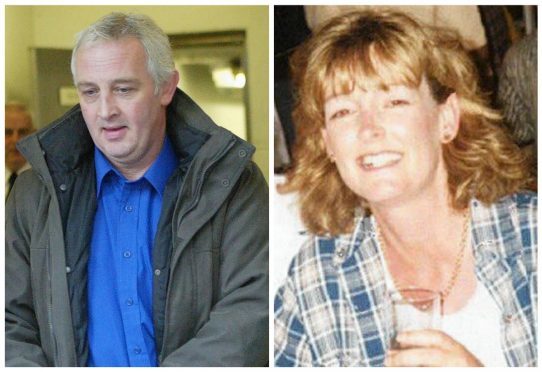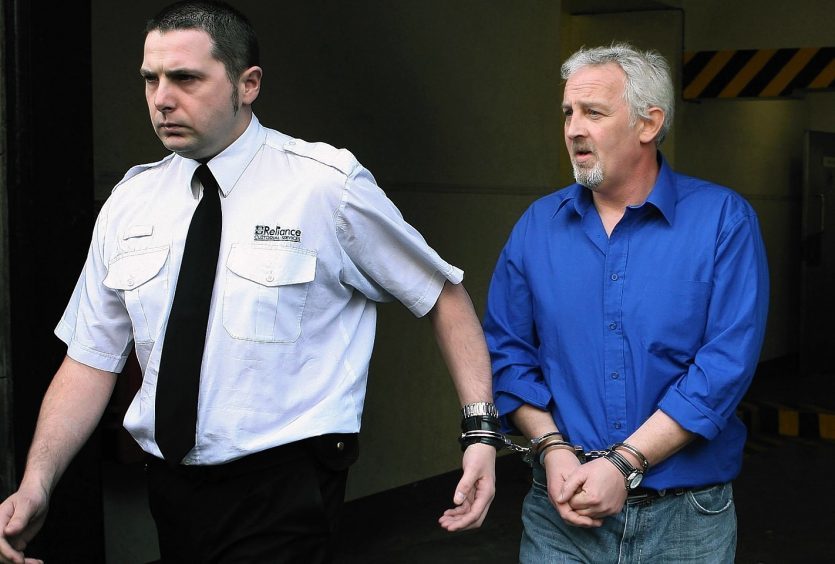A former detective who helped solve the Arlene Fraser murder case has admitted he does not believe her killer husband will ever reveal where her body is.
Nat Fraser has twice been convicted for murdering his wife Arlene, who disappeared from her home in Elgin in 1998.
The 33-year-old’s body has never been found.
Retired Detective Superintendent Alan Smith, the deputy senior investigating officer on the case, believes Fraser will never reveal the location of his wife’s body as it is the last piece of control he has over her.
Speaking on BBC Scotland series Crime Files, to be shown tomorrow night, he said: “He was always in control of Arlene — the money, the finances of the family.
“His whole world has fallen apart, but he still has a piece of control. He’s got the control of where Arlene is and I don’t think he’ll ever give that control up because it’s pretty much the last thing he’s got to give up.”
How do you convict without a body?
In the programme, criminologist Professor David Wilson explores how police and prosecutors build a murder case when the vital component – the body – is not found.
Housewife Arlene was last seen around 9am on April 28, 1998 as she waved her two children off to school. When a friend later arrived for lunch there was nobody home.
Police suspected her husband was involved as he was on bail at the time for her attempted murder. However, Fraser had an alibi – as the local fruit and veg man, he was on his morning rounds with a colleague.
Grampian Police conducted the most comprehensive “presumption of death” investigation ever carried out by a Scottish police force, driven by the fact Arlene made no contact with friends or family after she disappeared.
The couple had also started divorce proceedings.
Read more:
- How Elgin murder’s web of lies were untangled by top detective
- Arlene Fraser’s family retain hope they will learn what happened to her body
- Pathologist breaks silence on high-profile cases
Police made a breakthrough after it merged Fraser and a friend had bought a beige 1984 Ford Fiesta the day before Arlene disappeared and, according to the mechanic who sold them the car, had paid an extra £50 for him to remain quiet about the sale.
Police surmised that even if Fraser had been at work, he may have commissioned somebody else to commit the murder on his behalf.
Cop believes Fraser played up ‘cheery chap’ image to get away with murder
Fraser was found guilty of murdering Arlene in January 2003 and sentenced to life imprisonment, but successfully appealed his conviction in 2011.
Following a retrial, using new double jeopardy laws, Fraser was found guilty a second time and sentenced to 17 years in prison.
Mr Smith said he has “no doubt” that Fraser carefully planned the murder, and that he had always thought he would get away with if no body was found.
He believes the “controlling” father-of-two played up his “cheery, cheeky chap” reputation as part of his plan to get away with murder.
Mr Smith added: “That was a real challenge for us because the community had real difficulty believing that, A; a crime like that could occur in a small town like Elgin and B; that somebody like Nat Fraser could be responsible.
“Initially he was all over us in terms of the inquiry. He would come in every day, twice a day, but as time went on the visits became less frequent, we had to go looking for him to give him updates and often he would say to me ‘you’ve got an awful lot of bobbies involved in this investigation’.
“The inference to me was quite clear that if I had said to Nat, ‘look, I’m sorry, we’ve taken this as far as we can, we’re going to have to scale down the investigation’, he’d have been delighted.”
No answers, no parole?
During the programme, Peter Duff, professor of criminal justice at Aberdeen University, said he would support the introduction of Suzanne’s Law – which Arlene’s family have previously also backed.
The proposed law, named after murdered Suzanne Pilley, would prevent a person convicted of murder from getting parole if they are not prepared to say where the victim’s body is.
Prof Duff said: “If one is satisfied that a murder has taken place, you don’t need the body. The question one might put in the Nat Fraser case is, if she wasn’t murdered, where has she gone? What’s happened to her? It’s almost impossible to come up with any explanation.”
- Crime Files in on BBC Scotland tomorrow from 10.30pm.


